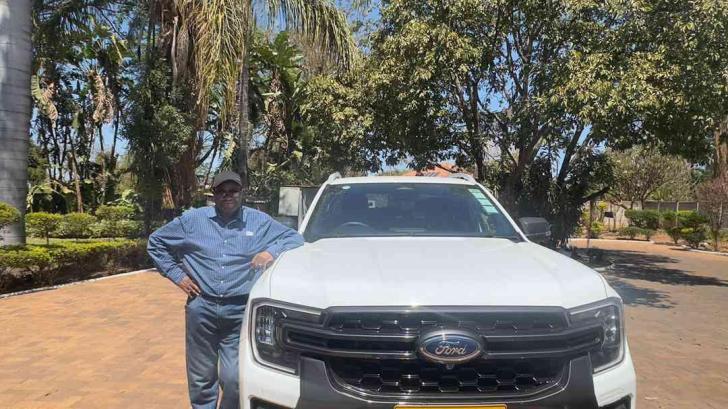News / Local
John Landa Nkomo's son banished from Zanu-PF conference
17 Oct 2024 at 08:04hrs |
7 Views

Jabulani Nkomo, son of the late Vice-President John Landa Nkomo, has been barred from attending the upcoming Zanu-PF annual conference after his name was mysteriously removed from the accreditation list. The conference is set to take place in Bulawayo next week, amidst growing tensions and factional infighting within the party.
Accreditation for delegates has been ongoing, but reports indicate that the process has been compromised by internal party disputes. Jabulani Nkomo expressed his frustration to NewsDay, stating that his name had initially been included in the accreditation list submitted from Tsholotsho district to the provincial office in Lupane. However, he discovered that his name had vanished without explanation.
"My name was on the list... but surprisingly, it disappeared along the way and was nowhere to be found," Jabulani said. He has since lodged a complaint with the relevant party offices but declined to comment further on the matter.
Insiders within Zanu-PF allege that provincial chairperson Richard Moyo conspired with his allies to remove Jabulani's name at the last minute, favoring the inclusion of Moyo's allies, such as former Senator Believe Gaule, despite Gaule's lack of affiliation with the current provincial structure. Gaule refuted these claims, directing inquiries back to Moyo.
Moyo, who also serves as the Matabeleland North Provincial Affairs and Devolution minister, distanced himself from the accreditation controversy, stating, "It is not my duty to accredit delegates, therefore, I was never involved in coming up with the list of delegates. If ever there is such a case, why should the person be removed?"
Bigboy Nkiwane, the Zanu-PF provincial administrator, could not be reached for comment regarding the situation. However, sources indicate that tensions began escalating in May when Jabulani was co-opted into the provincial coordinating committee, following the creation of a new position for deputy member of local government.
In that meeting, both Jabulani and Gaule were nominated for the post, necessitating an election. It is alleged that Gaule withdrew from the race, yet subsequent attempts were made to replace Jabulani with Gaule, leading to further discord among party members.
Compounding the internal strife, Zanu-PF is reportedly under pressure to endorse constitutional amendments aimed at extending presidential term limits. Sources suggest that there is significant opposition among grassroots members to the proposed agenda, which aims to allow President Emmerson Mnangagwa to extend his presidency until 2030.
Mnangagwa has publicly stated on multiple occasions that he does not intend to seek an extension beyond his current term, which concludes in 2028. He has indicated that the party would select its next leader in 2027. However, even with potential constitutional amendments, legal experts point out that the supreme law of Zimbabwe prohibits office bearers from benefiting from any amendments that would extend their tenure.
As the annual conference approaches, the tension within Zanu-PF raises questions about the party's unity and its future direction, with factional battles threatening to overshadow its leadership and policy decisions.
Accreditation for delegates has been ongoing, but reports indicate that the process has been compromised by internal party disputes. Jabulani Nkomo expressed his frustration to NewsDay, stating that his name had initially been included in the accreditation list submitted from Tsholotsho district to the provincial office in Lupane. However, he discovered that his name had vanished without explanation.
"My name was on the list... but surprisingly, it disappeared along the way and was nowhere to be found," Jabulani said. He has since lodged a complaint with the relevant party offices but declined to comment further on the matter.
Insiders within Zanu-PF allege that provincial chairperson Richard Moyo conspired with his allies to remove Jabulani's name at the last minute, favoring the inclusion of Moyo's allies, such as former Senator Believe Gaule, despite Gaule's lack of affiliation with the current provincial structure. Gaule refuted these claims, directing inquiries back to Moyo.
Moyo, who also serves as the Matabeleland North Provincial Affairs and Devolution minister, distanced himself from the accreditation controversy, stating, "It is not my duty to accredit delegates, therefore, I was never involved in coming up with the list of delegates. If ever there is such a case, why should the person be removed?"
Bigboy Nkiwane, the Zanu-PF provincial administrator, could not be reached for comment regarding the situation. However, sources indicate that tensions began escalating in May when Jabulani was co-opted into the provincial coordinating committee, following the creation of a new position for deputy member of local government.
In that meeting, both Jabulani and Gaule were nominated for the post, necessitating an election. It is alleged that Gaule withdrew from the race, yet subsequent attempts were made to replace Jabulani with Gaule, leading to further discord among party members.
Compounding the internal strife, Zanu-PF is reportedly under pressure to endorse constitutional amendments aimed at extending presidential term limits. Sources suggest that there is significant opposition among grassroots members to the proposed agenda, which aims to allow President Emmerson Mnangagwa to extend his presidency until 2030.
Mnangagwa has publicly stated on multiple occasions that he does not intend to seek an extension beyond his current term, which concludes in 2028. He has indicated that the party would select its next leader in 2027. However, even with potential constitutional amendments, legal experts point out that the supreme law of Zimbabwe prohibits office bearers from benefiting from any amendments that would extend their tenure.
As the annual conference approaches, the tension within Zanu-PF raises questions about the party's unity and its future direction, with factional battles threatening to overshadow its leadership and policy decisions.
Source - newsday
Join the discussion
Loading comments…




















